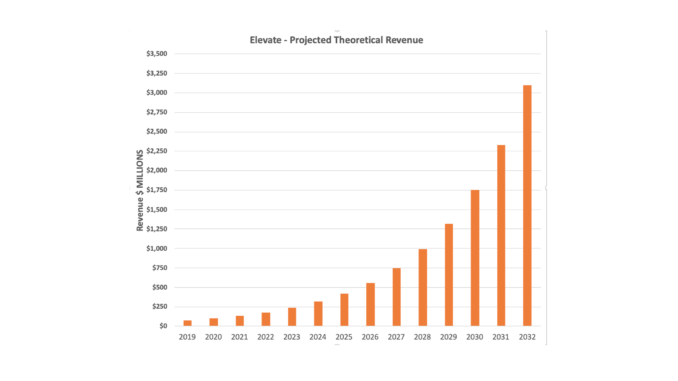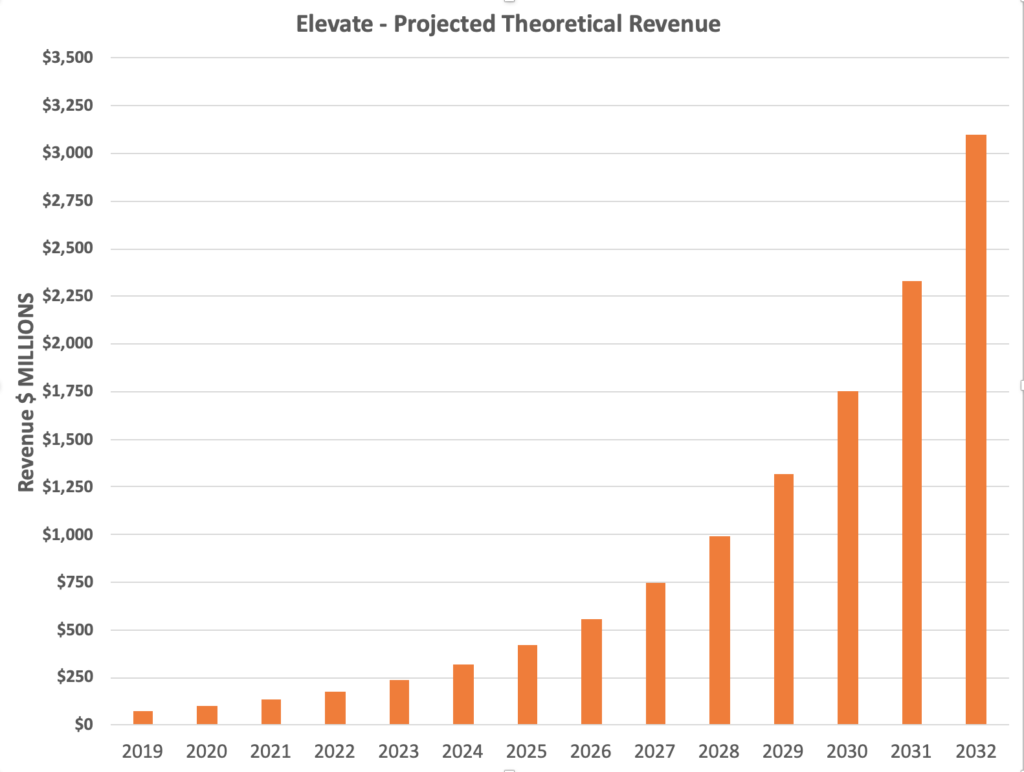
Law company, Elevate Services, has capped a period of rapid expansion and acquisition with a new injection of growth capital – $25m to be precise from Kayne Partners – but could it ever become a $1 billion business and really change the world?
At present Elevate, with all its growth, is expected to hit around $75m revenue across all its multiple business lines for 2019 – says the company. And much as Elevate is doing great work, tapping the best in AI technology, process and deployment of people to take on the corporate world’s legal process tasks, $75m remains a drop in the ocean – for now.
In fact, that has often been the main point made by some on the impact of ALSPs, LPOs and other types of process-focused legal businesses: compared to Big Law they remain a small fraction of total market share.
But, one thing that came with the Elevate announcement were some projections on future growth and this got Artificial Lawyer reaching for an Excel spreadsheet. As reported by Bloomberg, Elevate is projecting annual revenue growth now of 33% per annum.
If we take the mentioned $75m as the base line, i.e. revenue for 2019, and then project forward by 33% per annum we quickly get into some very interesting territory. That’s the power of compound growth. Bloomberg uses a slightly different timeline, but if we accept Elevate’s statement that it will hit $75m in 2019 and then take the company’s 33% projected growth per annum – then what you get is below.

Interestingly, and perhaps of a much more mundane nature, if Elevate starts from a base of $75m in 2019 and grows at 5% per annum indefinitely, (which is more in tune with how most law firms grow), rather than the spectacular path above, it would take decades to reach $1 billion – in fact not reaching that point until 2072, or 53 years.
What this shows is the power of compound growth, and how it can cut both ways depending on what kind of annual expansion can be sustained.
Naturally all projections have to be taken with a pinch of salt. But, the above theoretical super growth model is not impossible, especially if Elevate could keep scaling up and sucking in process work from across the market.
As can be seen, in Artificial Lawyer’s albeit clearly theoretical model, Elevate reaches $1 billion revenue by 2028. Then by 2032 the law company would hit over $3 billion – which is up there with some of the world’s largest law firms.
[Note: as rightly pointed out by Alex Hamilton, of Radiant Law, if you keep that kind of compound growth going – which of course would be impossible over the long term – you end up with crazy numbers, as would be the case for any business. Arguably the above, to some may already appear impossible for a legal sector business and they may be right – although it would not seem totally odd in some other sectors for some companies (mostly tech-related) at the start of their big growth spurt. Much depends on how long you can sustain a super high level of growth. Could a business in the legal sector really grow at 33% for more than two years? Could it really do so for five years like this, or even 10? It’s a big stretch, that is true, but it’s fun to explore theoretical limits and what they would look like. Probably the end result will be far short of this, but perhaps not as low as some may think. We will see…]
The question is whether the world’s largest firms would also have grown that much. Aside from massive mergers the likelihood is: no. Latham & Watkins and Baker McKenzie are not going to grow at this speed. The partners may well get a lot richer (almost certainly….!), but for total revenue, with so much of it based on high value input, it would be hard to scale so fast.
For Elevate they could be looking at a ‘pushing on an open door’ scenario. There is a lot of commercial legal process work out there in the legal market – tens of billions of dollars of it globally.
It is not impossible for them to reach this scale in such a world, especially if they keep acquiring other process focused businesses.
Now, you might ask, why does Artificial Lawyer care about Elevate and the whole process business world? The answer is that Elevate, aside from leveraging AI technology for doc review, is a means to an end – as AI tech also is – and that end is bringing efficiency and cost savings to a world of mass inefficiency and way too high prices for commercial legal work.
–
But, will Elevate reach a billion? There seems to be no reason why not. With more money invested they will be able to scale up. Marketing efforts will expand. More large corporates will take notice. The great legal machine that Elevate is building will become slicker and more efficient in itself.
Plus the investors will want growth. They will demand growth. And that concentrates the mind. Not that Elevate’s pioneering founder is lacking focus – Liam Brown is about as focused as one can get when it comes to disrupting the status quo.
Let’s give the last words to the investors and Liam.
‘Elevate is addressing a critical need in a sizeable market, with a new business model, just as change is beginning to take hold in the legal sector,’ said Leon Chen, Partner, Kayne Partner Funds (which made the $25m investment), and who has joined Elevate’s Board of Directors.
‘This investment will support our future growth plans, continuing the momentum created by our series of recent acquisitions,’ said Elevate Founder and Executive Chairman Liam Brown, referring to the five businesses Elevate acquired in late 2018 and early 2019.
–
Good luck to them.
–
P.S. if Elevate did eventually do an IPO (something that appears to be planned), that would not necessarily change the projected model above, but what it would do is really help with the flow of additional growth capital. It would also really increase the push to keep growing (as investors in public companies tend to demand constant growth) – and such economic forces may well be needed to help a business to keep expanding at the above rate for a sustained period.
Interestingly, once Elevate is a public company – if that happens one day – and the company stopped growing so rapidly, shareholders would no doubt push for some kind of new strategy to keep expanding and/or improving their returns.
One strategy would be to significantly decrease the prices of Elevate’s process services in order to take market share. That could trigger some serious competition in the market and accelerate the growing attack on the base legal labour layer of the traditional law firm pyramid leverage model.
A key reason why the legal market changes so slowly is a lack of economic imperative, i.e. no real competition, at least not compared to many other industries. A publicly-listed Elevate could well help to change that dynamic. That said, to really change things globally we’d need an increasing number of Elevate-style businesses of a $1 billon-plus scale. Elevate can’t do this alone.
Luckily there is a growing line of other players who’d like to take a piece of this process base layer. And it will be interesting to see what EY can do with its LPO acquisitions as well, for example.
To be continued…